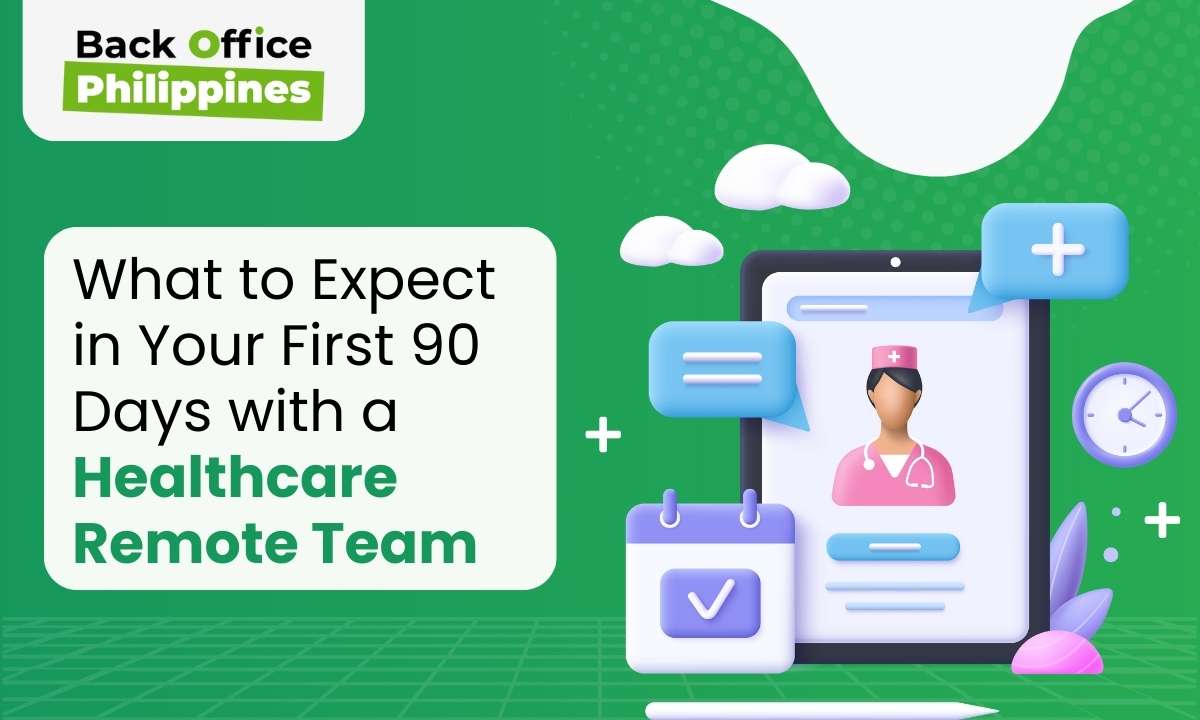When you decide to build virtual teams, especially a healthcare remote team, it can be a game-changer for your practice. Not only will you benefit from significant cost savings, but you will also be able to access specialized roles without compromising on quality.
With Back Office Philippines, you can easily scale your healthcare back-office team with skilled professionals who understand the nuances of healthcare operations. In this blog, we will walk you through what to expect in the first 90 days of working with your healthcare remote team.
Introduction: The First Steps to Success
Building a healthcare remote team takes time, preparation, and the right tools. In the first 90 days, you’ll lay the foundation for a successful long-term partnership. While this period may seem challenging, it’s a crucial time to onboard your virtual staff, set clear expectations, and integrate your team into your operations.
Back Office Philippines provides you with all the necessary support to ensure your healthcare back-office team is HIPAA-compliant, highly skilled, and ready to take on roles that are vital to your practice, such as medical billing assistants, insurance claims support, healthcare virtual assistants, and more.
The First 30 Days: Setting the Stage for Success
The first 30 days with your healthcare remote team are all about onboarding, communication, and aligning goals. During this period, you’ll focus on understanding your team’s capabilities, setting up effective communication channels, and defining the workflows that will make the collaboration smooth.
1. Onboarding Your Healthcare Remote Team
Onboarding your virtual staff is the first crucial step in ensuring they are ready to take on their roles effectively. Back Office Philippines has an extensive process to help you onboard your new healthcare remote team smoothly.
- Introduction to Company Culture and Tools: Ensure your new team members are familiar with the tools you use, such as scheduling software, communication platforms like Slack or Teams, and any other system that’s crucial for your practice.
- Role Clarification: Clearly define the roles of each team member. Whether they’re working as a medical billing assistant or patient support staff, make sure they understand their responsibilities and what you expect from them.
- Compliance Training: Given the sensitive nature of healthcare, your remote team must be familiar with HIPAA regulations and patient confidentiality requirements. Back Office Philippines ensures that all staff are HIPAA-compliant and that they understand the importance of patient data security.
2. Establishing Communication Channels
Effective communication is key to working with a remote team. Setting up the right communication channels will make a big difference in how smoothly things run.
- Daily/Weekly Check-ins: Regular check-ins are essential in the beginning. Whether you prefer daily or weekly meetings, use these sessions to align on progress, address challenges, and discuss any issues that arise.
- Collaborative Platforms: Back Office Philippines provides tools that help you manage your team efficiently. Make use of collaboration tools like project management software or cloud storage to track tasks and documents.
- Clear Expectations: Make sure your virtual staff knows how to communicate issues, report progress, and ask for assistance. It’s important to establish expectations early on to avoid miscommunication down the line.
3. Setting Up Key Performance Indicators (KPIs)
KPIs help you track the performance of your healthcare remote team. These should be specific to the tasks they are handling.
- For medical billing assistants, KPIs might include reducing billing errors or accelerating payment cycles.
- For insurance claims support, KPIs could focus on the number of claims processed and their approval rate.
Back Office Philippines offers support in defining the right KPIs and ensures your team is on track to meet your expectations.
Days 31-60: Building Processes and Streamlining Workflows
The next 30 days are dedicated to streamlining workflows and ensuring that your healthcare back-office remote team is operating efficiently. This phase is all about refining the systems you’ve put in place.
1. Optimizing Workflows
Once your team is fully onboarded, it’s time to focus on the operational side of things. Streamlining workflows helps in reducing inefficiencies and improving the overall productivity of your remote team.
- Standard Operating Procedures (SOPs): Work with your team to develop SOPs for common tasks. This ensures that everyone is on the same page and reduces errors due to misunderstandings.
- Automation Tools: Consider implementing automation for tasks like data entry, appointment scheduling, or insurance claim follow-ups. Back Office Philippines provides a team that can help integrate these tools into your existing systems.
- Frequent Reviews: Schedule weekly or bi-weekly reviews to ensure that your workflows are running smoothly. If there are any bottlenecks or issues, address them quickly to maintain productivity.
2. Training and Upskilling
During the first 60 days, you’ll also want to focus on training and upskilling your healthcare remote team. Investing in their development ensures that they continue to meet the evolving needs of your practice.
- Role-Specific Training: Your virtual staff should be well-versed in the specifics of their roles. For example, your medical billing assistants should be continually trained on the latest billing codes and insurance guidelines.
- Cross-Training: Consider cross-training your staff in different roles. This helps with workload distribution and ensures flexibility in your team as needs change.
3. Building Strong Relationships
It’s essential to build rapport with your healthcare remote team during this period. Take time to understand their challenges and provide feedback regularly.
- Positive Reinforcement: Acknowledge accomplishments and improvements. This keeps morale high and helps your team feel valued.
- Constructive Feedback: Provide clear, constructive feedback on areas that need improvement. This should be a collaborative process aimed at helping your remote team grow in their roles.
Days 61-90: Refining and Scaling Operations
In the final phase of your first 90 days, you’ll refine your processes, assess the performance of your healthcare remote team, and begin to scale operations as needed.
1. Performance Reviews and Adjustments
By this stage, you should have enough data to assess the performance of your team. Look at the KPIs you set earlier and see how well they are being met. If your team is performing well, consider scaling up by adding more roles.
- Monthly Performance Evaluations: Have a structured evaluation system in place to review the work of your virtual staff. This helps you identify areas of improvement or new opportunities for growth.
- Adjusting Goals: Based on performance reviews, you might need to adjust your team’s goals. If your remote team is excelling in certain areas, consider raising the bar for those roles.
2. Scaling Your Healthcare Remote Team
As your practice grows, your team needs to scale with you. One of the greatest advantages of working with Back Office Philippines is the flexibility to easily scale your healthcare remote team.
- Add New Roles: As you identify new areas where support is needed, such as additional medical transcriptionists or more patient support staff, you can quickly hire and integrate new team members.
- Flexible Staffing Solutions: Whether you need part-time or full-time staff, Back Office Philippines provides the flexibility to adjust your team size based on your evolving needs.
3. Ongoing Support and Collaboration
Even after the first 90 days, your collaboration with your healthcare remote team should remain a continuous process of improvement. Continue to invest in training, communication, and performance reviews to ensure long-term success.
- Continuous Communication: Keep open channels of communication to address any issues or suggestions for improvement. This fosters a strong, collaborative working relationship.
- Adapting to Changes: As your healthcare business evolves, so will the needs of your back office remote team. Be prepared to adapt and make changes as necessary.
Conclusion: A Strong Start with Your Healthcare Remote Team
The first 90 days of working with a healthcare remote team are critical for setting the stage for success. With the right onboarding, communication, and continuous improvements, you can build a high-performing, cost-effective healthcare back-office team.
Back Office Philippines offers the tools, expertise, and support needed to help you build virtual teams that are HIPAA-compliant, skilled, and ready to help your practice grow.
If you’re ready to start building your healthcare remote team, consider using our platform to get started. With our help, you can scale your team quickly, reduce costs by up to 77%, and ensure top-quality service.
Book a Free Consultation today and see how Back Office Philippines can help you build the best healthcare remote team for your practice.


